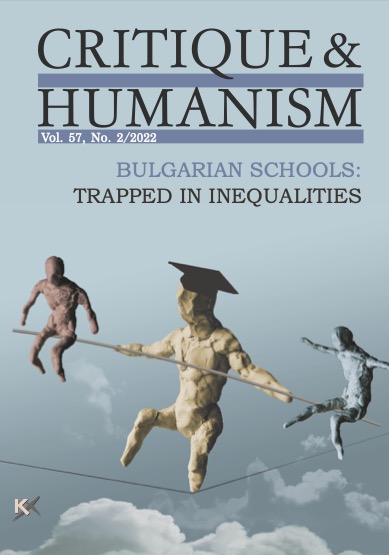Education and Inequalities: Problem Nodes and Public Speakers, Bulgaria 2017–2020
Education and Inequalities: Problem Nodes and Public Speakers, Bulgaria 2017–2020
Author(s): Milena IakimovaSubject(s): Social Sciences, Education, Sociology of Education
Published by: Фондация за хуманитарни и социални изследвания - София
Keywords: educational inequality; intellectual achievement; cultural capital; school competition; social vs educational function
Summary/Abstract: This article is based on discourse analysis and secondary analysis of data from research conducted under the project Educational Inequalities and Social Opportunities. Strategic Objectives of the Reforms in Bulgarian Secondary Education and Practical Results. The first part outlines the problem nodes in the relationship between education and inequality as found in the secondary analysis and the quantitative modules of the study. The second part examines how these problem nodes are addressed in the discursive strategies of the actors who speak publicly on the topic. The dominant public discourse on education, crisis in education, and educational reform in Bulgaria has been found to be what we have called ‘project-entrepreneurial’. It essentially responsibilizes families, identifying them as being responsible for their children’s educational achievement by forming their educational ‘motivation’. However, different strategies are conducted through this dominant discourse. It is employed by public and administrative actors when speaking about the need to reform the Bulgarian school system. This discourse is also employed by actors from the field of business who, however, responsibilize the school system through the construct of ‘adequacy to the needs of business and the labour market’. This discourse is also employed by NGOs whose mis- sions are oriented towards positive discrimination. The different strategies amplify the effects of the dominant discourse as follows: students are measured on the basis of intellectual achievements which the dominant discourse reduces to educational motivations formed in the family. This supports and legitimizes a process of ever earlier selection of children based on intellectual achievement, and serves to show desirable families that the school cherry-picks its children and to legitimize the reproduction of cultural capital. In the competitive environment in which they are placed, schools behave completely adequately and rationally – the successful ones become even more successful, while the unsuccessful ones occupy a vacated niche, that of social welfare. In this way the Bulgarian school system, while producing and reproducing inequality, still counteracts social exclusion.
Journal: Критика и хуманизъм
- Issue Year: 2/2022
- Issue No: 57
- Page Range: 9-23
- Page Count: 15
- Language: English
- Content File-PDF

